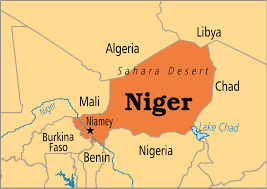APA – Niamey (Niger) – This decision is likely to exacerbate the humanitarian crisis prevailing in several regions of the country.
In a statement broadcast on Niger’s public television, the Minister of the Interior announced that “due to the current security situation and the operational commitment of the Nigerien armed forces, international organisations, national and international non-governmental organizations and UN agencies present in Niger have been informed that all activities and movements in the areas of operation are temporarily suspended.”
The press release does not specify the regions concerned, but in recent years the Nigerien army has been engaged in a number of military operations to combat terrorism, notably in the regions of Tillaberi and Tahoua, on the border with Mali, where the Islamic State in the Sahel (EIS) is active, and in Diffa, in the far south-east of the country, where Boko Haram and the Islamic State in West Africa (ISWAP) operate. These regions have been placed under a state of emergency, where the humanitarian situation has steadily deteriorated with the displacement of populations caused by violence by the insurgents, in addition to structural social challenges such as structural poverty, food insecurity and poor access to basic services.
The suspension of humanitarian activities in these areas is likely to exacerbate the crisis for the population, particularly women and children, who have already been struggling to receive aid from international organisations, NGOs and UN agencies for over a month, due to the economic and financial sanctions imposed on the country by the Economic Community of West African States (ECOWAS) following the coup on 26 July.
Critical humanitarian situation
According to the latest bulletin from the United Nations Office for Humanitarian Affairs (OCHA), published on 25 August, by 2023, 17 percent of Niger’s population, or around 4.3 million people, will be in need of vital humanitarian aid.
“This situation is due to the impact of flooding, conflict, loss of income and the absence of a sustainable solution,” says the UN office, which warns that “effective measures must be put in place to guarantee the protection of affected populations, provide adequate humanitarian aid and work towards sustainable solutions to strengthen the resilience of communities.”
According to the United Nations system, the political crisis has exacerbated “an already worrying food security situation.” In addition to the 3.3 million people facing severe food insecurity, 7.3 million people in a situation of moderate food insecurity are likely to find themselves in a severe situation due to the severity of this shock in conjunction with seasonal challenges and persistent insecurity, warned several UN agencies active in humanitarian aid.
UN officials also said in a statement on 29 August 2023 that the sanctions were blocking vital humanitarian aid, such as food and medicines, before announcing that “requests for exemption had been submitted to ECOWAS.”
For more than a month, trucks carrying food and humanitarian aid have been blocked in Niger’s ports and border countries following the closure of borders. On local markets, the price of basic necessities is rising. “There is no way of getting humanitarian aid into the country,” said Emmanuel Gignac, representative of the United Nations High Commissioner for Refugees (UNHCR) in Niger, at a press briefing in Geneva on the same day. The UN official pointed out that an official letter written by Martin Griffiths, Under-Secretary-General for Humanitarian Affairs and Emergency Relief Coordinator, to the Office for the Coordination of Humanitarian Affairs had been sent to ECOWAS to obtain exemptions.
“Despite the deterioration of the political climate in the country, the humanitarian community reaffirms its determination to remain on the ground and to continue to operate in accordance with the principles of humanity, impartiality, neutrality and independence, which are the guarantors of an effective response and a community-centered approach,” the UN agencies and their partners have stated. In addition to the humanitarian exemption that is needed to ensure that vital aid can continue to reach the most deprived communities, they also warned of the low level of stocks available in the country, with most humanitarian actors indicating that they have only limited stocks in the country, raising fears of a total interruption of assistance as early as September for some.
International organisations, NGOs and humanitarian agencies therefore believe that an air bridge for humanitarian actors is necessary and have called on donors to “mobilize urgent and flexible funding to enable humanitarian actors to save lives.”
AYB/ac/fss/as/APA


